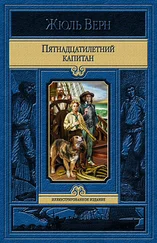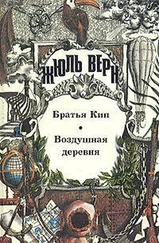This exercise was not only healthful in itself, but it was acknowledged that, in case of necessity, it might become a very useful means of locomotion. As Captain Servadac remarked, it was almost a substitute for railways, and as if to illustrate this proposition, Lieutenant Procope, perhaps the greatest expert in the party, accomplished the twenty miles to Gourbi Island and back in considerably less than four hours.
The temperature, meanwhile, continued to decrease, and the average reading of the thermometer was about 16 degrees F. below zero; the light also diminished in proportion, and all objects appeared to be enveloped in a half-defined shadow, as though the sun were undergoing a perpetual eclipse. It was not surprising that the effect of this continuously overhanging gloom should be to induce a frequent depression of spirits amongst the majority of the little population, exiles as they were from their mother earth, and not unlikely, as it seemed, to be swept far away into the regions of another planetary sphere. Probably Count Timascheff, Captain Servadac, and Lieutenant Procope were the only members of the community who could bring any scientific judgment to bear upon the uncertainty that was before them, but a general sense of the strangeness of their situation could not fail at times to weigh heavily upon the minds of all. Under these circumstances it was very necessary to counteract the tendency to despond by continual diversion; and the recreation of skating thus opportunely provided, seemed just the thing to arouse the flagging spirits, and to restore a wholesome excitement.
With dogged obstinacy, Isaac Hakkabut refused to take any share either in the labors or the amusements of the colony. In spite of the cold, he had not been seen since the day of his arrival from Gourbi Island. Captain Servadac had strictly forbidden any communication with him; and the smoke that rose from the cabin chimney of the Hansa was the sole indication of the proprietor being still on board. There was nothing to prevent him, if he chose, from partaking gratuitously of the volcanic light and heat which were being enjoyed by all besides; but rather than abandon his close and personal oversight of his precious cargo, he preferred to sacrifice his own slender stock of fuel.
Both the schooner and the tartan had been carefully moored in the way that seemed to promise best for withstanding the rigor of the winter. After seeing the vessels made secure in the frozen creek. Lieutenant Procope, following the example of many Arctic explorers, had the precaution to have the ice beveled away from the keels, so that there should be no risk of the ships' sides being crushed by the increasing pressure; he hoped that they would follow any rise in the level of the ice-field, and when the thaw should come, that they would easily regain their proper water-line.
On his last visit to Gourbi Island, the lieutenant had ascertained that north, east, and west, far as the eye could reach, the Gallian Sea had become one uniform sheet of ice. One spot alone refused to freeze; this was the pool immediately below the central cavern, the receptacle for the stream of burning lava. It was entirely enclosed by rocks, and if ever a few icicles were formed there by the action of the cold, they were very soon melted by the fiery shower. Hissing and spluttering as the hot lava came in contact with it, the water was in a continual state of ebullition, and the fish that abounded in its depths defied the angler’s craft; they were, as Ben Zoof remarked, "too much boiled to bite."
At the beginning of April the weather changed. The sky became overcast, but there was no rise in the temperature. Unlike the polar winters of the earth, which ordinarily are affected by atmospheric influence, and liable to slight intermissions of their severity at various shiftings of the wind, Gallia’s winter was caused by her immense distance from the source of all light and heat, and the cold was consequently destined to go on steadily increasing until it reached the limit ascertained by Fourier to be the normal temperature of the realms of space.
With the over-clouding of the heavens there arose a violent tempest; but although the wind raged with an almost inconceivable fury, it was unaccompanied by either snow or rain. Its effect upon the burning curtain that covered the aperture of the central hall was very remarkable. So far from there being any likelihood of the fire being extinguished by the vehemence of the current of air, the hurricane seemed rather to act as a ventilator, which fanned the flame into greater activity, and the utmost care was necessary to avoid being burnt by the fragments of lava that were drifted into the interior of the grotto. More than once the curtain itself was rifted entirely asunder, but only to close up again immediately after allowing a momentary draught of cold air to penetrate the hall in a way that was refreshing and rather advantageous than otherwise.
On the 4th of April, after an absence of about four days, the new satellite, to Ben Zoof’s great satisfaction, made its reappearance in a crescent form, a circumstance that seemed to justify the anticipation that henceforward it would continue to make a periodic revolution every fortnight.
The crust of ice and snow was far too stout for the beaks of the strongest birds to penetrate, and accordingly large swarms had left the island, and, following the human population, had taken refuge on the volcanic promontory; not that there the barren shore had anything in the way of nourishment to offer them, but their instinct impelled them to haunt now the very habitations which formerly they would have shunned. Scraps of food were thrown to them from the galleries; these were speedily devoured, but were altogether inadequate in quantity to meet the demand. At length, emboldened by hunger, several hundred birds ventured through the tunnel, and took up their quarters actually in Nina’s Hive. Congregating in the large hall, the half-famished creatures did not hesitate to snatch bread, meat, or food of any description from the hands of the residents as they sat at table, and soon became such an intolerable nuisance that it formed one of the daily diversions to hunt them down; but although they were vigorously attacked by stones and sticks, and even occasionally by shot, it was with some difficulty that their number could be sensibly reduced.
By a systematic course of warfare the bulk of the birds were all expelled, with the exception of about a hundred, which began to build in the crevices of the rocks. These were left in quiet possession of their quarters, as not only was it deemed advisable to perpetuate the various breeds, but it was found that these birds acted as a kind of police, never failing either to chase away or to kill any others of their species who infringed upon what they appeared to regard as their own special privilege in intruding within the limits of their domain.
On the 15th loud cries were suddenly heard issuing from the mouth of the principal gallery.
"Help, help! I shall be killed!"
Pablo in a moment recognized the voice as Nina’s. Outrunning even Ben Zoof he hurried to the assistance of his little playmate, and discovered that she was being attacked by half a dozen great sea-gulls, and only after receiving some severe blows from their beaks could he succeed by means of a stout cudgel in driving them away.
"Tell me, Nina, what is this?" he asked as soon as the tumult had subsided.
The child pointed to a bird which she was caressing tenderly in her bosom.
"A pigeon!" exclaimed Ben Zoof, who had reached the scene of commotion, adding:
"A carrier-pigeon! And by all the saints of Montmartre, there is a little bag attached to its neck!"
He took the bird, and rushing into the hall placed it in Servadac’s hands.
Читать дальше
![Жюль Верн Off on a Comet [Hector Servadac] обложка книги](/books/30131/zhyul-vern-off-on-a-comet-hector-servadac-cover.webp)










![Жюль Верн - Властелин мира [сборник]](/books/407848/zhyul-vern-vlastelin-mira-sbornik-thumb.webp)
